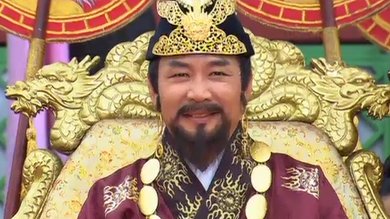[HanCinema's Drama Review] "Dae Jo Yeong" Episodes 6-10
 By William Schwartz | Published on
By William Schwartz | Published on
In the previous article in this series, I noted how the first five episodes of "Dae Jo Yeong" are basically the same story as the better known feature film "The Great Battle" from twelve years later, but with more of a focus on the political than the mythical. The following five episodes really drive the point home, though, by getting into what happened after this particular war. The short version is, the Tang Emperor Taizong (played by Song Yong-tae) is harassed until he's back behind the Great Wall.
Advertisement
Despite the Tang Emperor being the obvious villain of the first part of the story, "Dae Jo Yeong" is notable for portraying him oddly sympathetically, slowly dying with regret at the fate of the many followers who died due to his hubris. This isn't the militaristic psycho of "The Great Battle" modern viewers are more familiar with. The whole of the sixth episode basically amounts to Taizong realizing to his horror that he's wrecked this situation so badly that even a successful retreat feels like a longshot.
Meanwhile, back in Goguryeo, the political conflict takes on a very different context. The title character Dae Jo-yeong (played by Choi Soo-jong) finally appears initially as a baby born under an auspicious star. His father, the capable general Dae Joong-sang (played by Im Hyuk) tries but ultimately fails to protect his son by pretending like he's a girl. Ultimately, Dae Joong-sang is led to believe that his wife Dal-gi (played by Ha Da-som) and son were both killed due to this superstition.
Dae Joong-sang was a fairly young officer in the actual Ansi Fortress battle, so he doesn't appear in "The Great Battle" at all and his importance in "Dae Jo Yeong" is overstated and conflated with his later reputation. What the script in "Dae Jo Yeong" does with this is ascribe a very different retrospective view on myth. Where "The Great Battle" is a nationalist tale of good versus evil, "Dae Jo Yeong" is far more introspectively political.
The auspicious star is correct in identifying Dae Jo-yeong's importance, yet the extreme reaction to this dubious information is what defines the Goguryeo regime as corrupt despite its recent victoy. By the end of the tenth episode, we're already seeing ample evidence of conflicted loyalty. Dae Jo-yeong is a patriot of exceptional ability, yet lives as a slave because others fear his potential. The story is less about heroes and villains than it is motivations.
Written by William Schwartz
___________
"Dae Jo Yeong" is directed by Jeong Yeong-cheol, Kim Jong-seon, Yoon Seong-sik, written by Jang Yeong-cheol, and features Choi Soo-jong, Jung Bo-suk, Lee Deok-hwa, Park Ye-jin, Hong Soo-hyun, Kim Jin-tae. Broadcasting information in Korea: 2006/09/16~2007/12/23, Sat, Sun 21:40 on KBS.
Where to Watch
Powered by William Schwartz
William Schwartz
Staff writer. Has been writing articles for HanCinema since 2012, having lived in South Korea from 2011 to 2021. He is currently located in the Portland metropolitan area. William Schwartz can be contacted via william@hancinema.net, and is open to requests for content in future articles.




